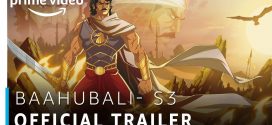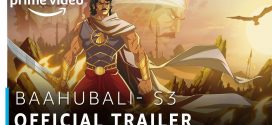Episode 4 of Upanishad Ganga brings us the story of AshtaVakra. AshtaVakra was born with eight deformities (two feet, two knees, two hands, the chest and the head). Reference to his character is found in Ramayana, Mahabharata and Chhandogya Upanishada.
His story is often viewed as a form of debate about the importance of beauty. Philosophers say that the physical beauty is not the ultimate truth. And it fades over time. It is the inner beauty which will remain forever and hence more important. But, how often we realize it? Or even follow our actions based on that philosophy in our real life? Aren’t we attracted to the beauty only? Do we like to see ourselves in the mirror when we are ill or not in good condition? Do we like to see getting older, grey or white hairs on our face? Aren’t we try everything to keep ourselves groomed and young?
The story of Ashtavakra is about the knowledge and peace. It gives us simple message that one should not proud so much for his own knowledge, there is always someone who is better than you, you may not just found him yet. And if you are better than others that doesn’t mean that others are not good. You must not use your influence or power or knowledge to harass or bully those who are not up-to-your-level. Knowledge should give you wisdom. Otherwise it is of no use!
The story of Ashtavakra brings the message of global peace. The below given verse was simply spoken by a lot, but he was the one who lived it:
ॐ स॒ह ना॑ववतु । स॒ह नौ॑ भुनक्तु । स॒ह वी॒र्यं॑ करवावहै । ते॒ज॒स्वि ना॒वधी॑तमस्तु॒ मा वि॑द्विषा॒वहै॑ ॥ ॐ शान्ति॒ः शान्ति॒ः शान्ति॑ः ॥
So the title of the episode Universal Welfare is justified.
| TV Serial | : |
Upanishad Ganga
|
| Producers | : | Chinmaya Mission |
| Director | : |
ChandraPrakash Dwivedi
|
| Starring | : | Abhimanyu Singh, Vishwa Badola, Rushad Rana, Jaya Bhattacharya, Zakir Hussain, Mukesh Tiwari, Vrajesh Hirjee, Sai Deodhar, Purva Parag, Ravi Khanvilkar, K K Raina, Sandeep Mohan, Umang Gurjar, Rasika Duggal, Auroshikha Dey, Gagan Malik, Huma Qureshi, Faisal Rashid, Usha Rana, Gyanesh Pandey, Dev Khubnani, Amit Behl, and others… |
| Quick Purchase Links | : |
Purchase from Amazon.Com Pruchase from Amazon.in Buy from Flipkart.com |
The episode is a dramatized version of Ashtavakra’s tale. Vrajesh Hirji played the title role convincingly. He has the flair of acting and he got a chance to prove it. His body language is authentic. The starting of the story is done on the stage and then it moves to the outdoor locations. The narration introduces the character on the fly. The introductory conversation between Ashtavakra and his mother is emotional and it clearly shows how determined Ashtavakra is to know the truth about his father. The lady playing his mother shows convincing expressions.
The incident when Ashtavkara was sat in the lap of Sage Uddalaka and was dragged by Shwetketu, the real son of Uddalaka by saying that Let me sit in my father’s lap, you go to your father! is narrated very well. It tells the dramatic events in simple and effective manner. On one hand it convey the childish incident, on the other it explores the attributes of jealousy and possessiveness.
The conversation between Sage Uddalaka and Ashtavakra, when Ashtravakra was trying to convince him to let him go to King Janak’s court and challenge Bandin (or Vandin), who was responsible for taking his father’s life, for Shastrartha (the debate of knowledge); is worth to watch. The best dialog is here is the question asked by Ashtavakra that Does knowledge comes with the age?. The scene is well thought, you can see daily routine was being performed in the background, during the conversation. This detailing shows that how careful the director was for small stuffs, when filming.
The city of Lord Janak doesn’t look like traditional city at all. The debate between the gatekeeper at Janak’s place and Ashtavakra is worth watching. Apart from reiterating his views about knowledge and respect, the conversation shows how confident and determined he was. He, by his eyes and facial expressions, was able to give us the look of a furious soldier, who is determined to overpower all his opponents single handed in the battlefield! The actor who accompanied him is not showing any expressions.
It would be repetitive to say about the acting and dialogs at various scenes, but the response of Ashtavkra to Janak and his courtiers, when the laughed on the physical appearance of Ashtavakra – is worth watching. The debate between Bandin and Ashtavakra is the highest point, both in terms of small yet powerful punches in terms of dialogs and acting. It is the end of the debate which conquers all.
It is out and out Vrajesh Hirji’s episode we can say. The supportive cast has mixed performances to offer. The background music is effective though. Janak’s court is less effective as set though. (May be the set designer tried to make it look as real as possible, but it looks like a camp in the jungle). The script is backed with well done research for sure.
The DVD quality is good and it brings the fantastic content which matters the most. Our personal verdict is, one shouldn’t miss this TV Serial, which is an attempt to look at the dramatized version of some of the ancient documents which are the vault of knowledge and wit.
Are you going to watch this TV Serial? What you think about this episode? If you find this review helpful in making your buying decision (or decision to spend your time to watch it), do not forget to share it with your friends and family via various social networks like Facebook, Google+, and others.
It is worth to note that this episode is available to watch for Free on YouTube:
 ThinkerViews – Views And Reviews Personal views and reviews for books, magazines, tv serials, movies, websites, technical stuff and more.
ThinkerViews – Views And Reviews Personal views and reviews for books, magazines, tv serials, movies, websites, technical stuff and more.



